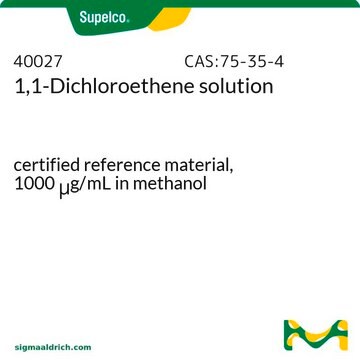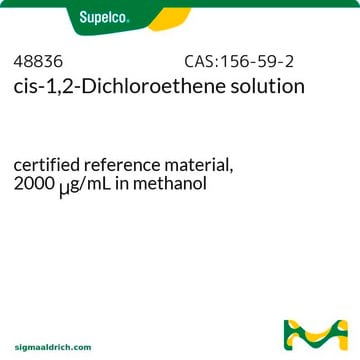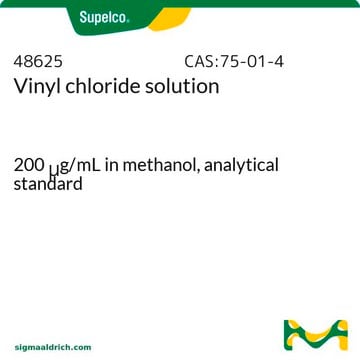163023
1,1-Dichloroethylene
contains 200 ppm MEHQ as inhibitor, 99%
Sinónimos:
Vinylidene chloride
About This Item
Productos recomendados
densidad de vapor
3.46 (vs air)
presión de vapor
9.68 psi ( 20 °C)
Ensayo
99%
Formulario
liquid
temp. de autoignición
968 °F
contiene
200 ppm MEHQ as inhibitor
lim. expl.
15.5 %
bp
30-32 °C (lit.)
mp
−122 °C (lit.)
densidad
1.213 g/mL at 20 °C (lit.)
temp. de almacenamiento
2-8°C
cadena SMILES
ClC(Cl)=C
InChI
1S/C2H2Cl2/c1-2(3)4/h1H2
Clave InChI
LGXVIGDEPROXKC-UHFFFAOYSA-N
¿Está buscando productos similares? Visita Guía de comparación de productos
Aplicación
Palabra de señalización
Danger
Frases de peligro
Consejos de prudencia
Clasificaciones de peligro
Acute Tox. 3 Oral - Acute Tox. 4 Inhalation - Carc. 2 - Eye Irrit. 2 - Flam. Liq. 1 - Skin Irrit. 2
Código de clase de almacenamiento
3 - Flammable liquids
Clase de riesgo para el agua (WGK)
WGK 3
Punto de inflamabilidad (°F)
-2.2 °F
Punto de inflamabilidad (°C)
-19 °C
Equipo de protección personal
Eyeshields, Faceshields, Gloves
Listados normativos
Los listados normativos se proporcionan para los productos químicos principalmente. Para los productos no químicos sólo se puede proporcionar información limitada. Si no hay ninguna entrada, significa que ninguno de los componentes está en la lista. Es obligación del usuario garantizar el uso seguro y legal del producto.
EU REACH Annex XVII (Restriction List)
Elija entre una de las versiones más recientes:
¿Ya tiene este producto?
Encuentre la documentación para los productos que ha comprado recientemente en la Biblioteca de documentos.
Los clientes también vieron
Nuestro equipo de científicos tiene experiencia en todas las áreas de investigación: Ciencias de la vida, Ciencia de los materiales, Síntesis química, Cromatografía, Analítica y muchas otras.
Póngase en contacto con el Servicio técnico












